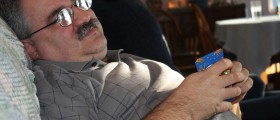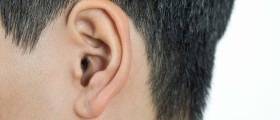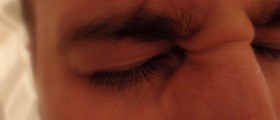Age-related hearing loss is medically known as presbycusis. It develops as a consequence of the cumulative effects of the process of aging on one's auditory system. In elderly people, the aging process is blamed for gradual deterioration in general, meaning that all organs and organs fail to perform as they used to once the person was young.
Even though some elderly people adjust to gradual hearing loss, others find the condition rather frustrating and irritating. This is the reason why presbycusis in many elderly individuals may cause loneliness, anger, or depression.

More about Presbycusis
The condition affects both ears. It is estimated that approximately half of all people older than 60 years of age develop the condition. This explains why presbycusis is considered the second most common cause of disability in this group of people.
In the majority of cases, hearing loss develops as a consequence of degeneration of the inner ear, to be more precise, the area of the inner ear containing microscopic blood vessels. There are additional changes to hair cells accompanied by loss of these cells and further hearing problems.
Older people, in the beginning, develop problems regarding understanding women and children while they retain the ability to understand the low-pitched male voices. So, the higher-pitched consonants that give clearness to speech are initially either missing or distorted. Progression of the disease makes it more difficult to understand speech.
Even though presbycusis generally develops due to the very process of aging, the condition is more frequent in individuals who are genetically predisposed. Diet and lifestyle play additional roles in the onset of such hearing loss. Several more contributing factors are exposure to noise in earlier life, a history of ear infections, and intake of certain ototoxic drugs.
Presbycusis Treatment Options
Even though presbycusis is practically incurable, it may be treated, and the condition's negative effects at least postponed for a while.
- Studies from the last decade have highlighted the relationship between presbycusis and cognition. Indeed, they have shown that hearing loss is related to an accelerating cognitive decline and an increased risk of dementia. A recent study even found that presbycusis is the primary risk factor of dementia in middle life that could be controlled.
- Hearing loss can directly be linked to cognitive health by reducing social engagement, overloading cognitive resources, changing brain structure and function, or deteriorating the auditory/cognitive system. It is likely that all of these explanations are not exclusive, and each may contribute to this association between hearing loss and cognitive decline.
- The participants in this study were divided into two groups: an elderly group (Group E) composed of 69 participants aged between 51 and 84 years (mean 66.7 +8.4, 18 M and 51 W), and a young group (Group Y) composed of 30 participants aged between 21 and 30 years (mean 25.3 ± 2.68, 17 M and 13 W). Group E was recruited by the RISC (relai d’information des sciences cognitives, France) platform of the CNRS, or by contacting associations which were likely to have people of appropriate ages. Some of them were retired, while others were still working. All of the participants were autonomous, and came to the laboratory without assistance.
- One of the major finding of the study is evidence of aging’s effects on hearing, inhibition and the latency of both saccades and vergence eye movements. Although prior studies exist considering one aspect or the other, to our knowledge, no studies investigated all of these aspects together on the same population. The second major finding is evidence of a correlation between speech recognition in silence and the latency of saccades regardless of age.
Treatment for presbycusis in the majority of cases includes appropriate hearing aids. A well-experienced doctor will suggest the type of hearing aid most suitable for each patient. This is only a partial solution to the problem.
Reduced or completely lost speech discrimination can be dealt with by learning to lipread. Presbycusis patients are suggested to attend lipreading classes, and this way, continue communication with people from their surroundings.
Those who cannot deal with hearing loss inevitably developed may refuse to maintain any social contact and become isolated and depressed. These issues require additional treatments and can be detrimental to patients and their families.

















Your thoughts on this
Loading...